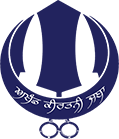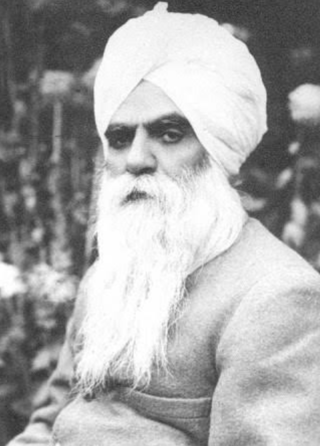
In Sikhism, the Five Ks are five items that Guru Gobind Singh, in 1699, commanded Khalsa Sikhs to wear at all times. They are: kesh, kangha, kara, kachera, and kirpan.
The following outline is provides an overview of Sikhism, or Sikhi.

The Sikh gurus are the spiritual masters of Sikhism, who established this religion over the course of about two and a half centuries, beginning in 1469. The year 1469 marks the birth of Guru Nanak, the founder of Sikhism. He was succeeded by nine other human gurus until, in 1708, the Guruship was finally passed on by the tenth guru to the holy Sikh scripture, Guru Granth Sahib, which is now considered the living Guru by the followers of the Sikh faith.

The Akhand Kirtani Jatha, alternatively romanized as the Akhand Keertanee Jathaa and abbreviated as AKJ, is a jatha and sect of Sikhism dedicated to the Sikh lifestyle. The Jatha follows a strict discipline in keeping the Rehat of Guru Gobind Singh. They also enjoy an active style of Keertan recited by Sikhs in a collective manner in front of Guru Granth Sahib. This style of Keertan is relatively simple, and the entire congregation devotionally participates in singing along.

Bhai Mani Singh was an 18th-century Sikh scholar and martyr. He was a childhood companion of Guru Gobind Singh and took the vows of Sikhism when the Guru inaugurated the Khalsa in March 1699. Soon after that, the Guru sent him to Amritsar to take charge of Harmandir Sahib, which had been without a custodian since 1696. He took control and steered the course of Sikh destiny at a critical stage in Sikh history.

Bhagat Puran Singh was an Indian writer, environmentalist, and philanthropist. As a young man he decided to dedicate his life to humanitarian work, and in 1947, he established Pingalwara, a home for the sick and disabled in Amritsar. He was also an environmental campaigner, raising awareness of pollution and soil erosion and writing many books about environmental topics.

The Janamsakhis, are legendary biographies of Guru Nanak – the founder of Sikhism. Popular in the Sikh history, these texts are considered by scholars as imaginary hagiographies of his life story, full of miracles and travels, built on a Sikh oral tradition and some historical facts. The first Janamsakhis were composed between 50 and 80 years after his death. Many more were written in the 17th and 18th century. The largest Guru Nanak Prakash, with about 9,700 verses, was written in the early 19th century by Kavi Santokh Singh.

Bhai Vir Singh was an Indian poet, scholar, and theologian of the Sikh revival movement, playing an important part in the renewal of Punjabi literary tradition. Singh's contributions were so important and influential that he became canonized as Bhai, an honorific often given to those who could be considered a saint of the Sikh faith.

Varan Bhai Gurdas, also known as Varan Gyan Ratnavali, is the name given to the 40 vars which is traditionally attributed to Bhai Gurdas.
Rehat refers to the rules and traditions which govern the unique Sikh lifestyle and determines correct Sikh orthodoxy and orthopraxy. The Sikh Rehit Maryada is a code of conduct and conventions for Sikhism. The final version of the Rehat Maryada was approved by the Shiromani Gurdwara Parbandhak Committee, Amritsar in 1945. The Rehat Maryada was created to provide guidance to Sikhs on practical and functional aspects of daily life, including the operations of Sikh Gurdwaras, and religious practices to foster cohesion throughout the community. Rehitnāma is a Punjabi term that refers to a genre of Sikh religious literature which expounds upon specifiying an approved way of life for a Sikh.
Punjabi literature, specifically literary works written in the Punjabi language, is characteristic of the historical Punjab of India and Pakistan and the Punjabi diaspora. The Punjabi language is written in several scripts, of which the Shahmukhi and Gurmukhī scripts are the most commonly used in Pakistan and India, respectively.

Professor Puran Singh was a Punjabi poet, scientist and mystic. Born in Abbottabad, now in Pakistan, in a Sikh family, he is acclaimed as one of the founders of modern Punjabi poetry. He passed his matriculation examination at the Mission High School Rawalpindi in 1897 and, after obtaining a scholarship for the years 1900 to 1903, obtained a degree in Industrial Chemistry from Tokyo University in Pharmaceutical Sciences. Though a born Sikh he became a Buddhist Bhikshu and a sanyasi under influence of Ukakura a Japanese Buddhist monk and Swami Ramtirath respectively before he finally got settled as a Sikh mystic when he came under influence of Bhai Vir Singh during a Sikh Educational Conference meeting at Sialkot in 1912.

Sri Guru Granth Sahib World University is a private university in Fatehgarh Sahib, Punjab, India. It was established under Punjab State Act 20/2008 and is recognized by UGC under section 2(f) of the UGC Act, 1956. Sardar Prakash Singh Badal announced the setting up of Sri Guru Granth Sahib World University at Fatehgarh Sahib, the holy place of martyrs, on the occasion of the fourth centenary celebrations of the compilation and the first installation of Sri Adi (Guru) Granth Sahib in 2004.
Sikh titles are honorifics appended to the names of members of the Sikh community. Their form may be prefixes or suffixes to names, or the title may be used alone, in place of the name. They may denote social status or relationship, occupational field, or religious standing. When used as a form of address, they are often intended to convey respect.
Dera Khalsa is a village in the Kallar Syedan Tehsil, Rawalpindi District, Punjab province of Pakistan. The name was given by rulers of this region during Sikh rule in Punjab. This name is still used to refer this village. Presently the entire population of this village is Muslim, having strong religious beliefs and 95% of existing families are migrated from Jammu in 1947. Presently residing families settled in this village in 1951–52.

The Guru Granth Sahib, is the central religious text of Sikhism, considered by Sikhs to be the final sovereign Guru of the religion. It contains 1430 Angs, containing 5,894 hymns of 36 saint mystics which includes Sikh gurus, Bhagats, Bhatts and Gursikhs. It is notable among foundational religious scriptures for including hymns from writers of other religions, namely Hindus and Muslims. It also contains teachings of the Sikh gurus themselves.











